OPINIONS and QUERIES SUGGESTED FUNCTIONS OF ROAD AND RAIL C OMMENTING,
Page 32

Page 33

If you've noticed an error in this article please click here to report it so we can fix it.
in your issue dated October 16, upon my letter to "The Times" (October 10), you say : " This is obviously another attempt by an interested party to eliminate all long-distance tfansport by road . ." If my letter bears this interpretation, I am sorry, because your reading does not correctly represent my views. I intended to suggest that the railways (now that the motor vehicle has made communications more flexible) should confine the locomotive moving on rails to its proper economic function—the movement of heavy loads at high speeds between concentration centres fed and tapped by road services. The savings I quoted were based upon traffic actually carried by the railways before the war, and not upon the withdrawal of any traffic from the road haulier.
In my view it would be to the advantage of road hauliers (still dealing direct with their customers) to hand certain traffic to the railways at concentration centres for intermediate haulage, and to the railways to pass certain of their traffic to the road hauliers, when this would avoid the running of lightly loaded trains.
Much of the conflict in the past has arisen froin the fact that the railways made the mistake of struggling for all the traffic, irrespective of whether they could carry it economically or not. There is much traffic which the locomotive running on rails would be far better without. The railway companies failed to recognize that this group of traffic, although inflating the gross tonnage and gross revenue figures, was (on account of the great expense arising out of the method of handling it) such a birden upon their operating as to depress the whole of their net revenues.
As to the suggestion that the roads might become the branch lines of the railways, I think that roads and railways should be regarded and should be operated as essential parts of a comprehensive system of communications (as should canals and coastwise shipping) with both joint and independent functions, briefly described thus : Ji) Independent rail services, e.g., coal pit to rail-connected port or works, determined by the train-load factor,.
(ii) Independent road services, either railway or road-haulier. • (iii) Road/rail services, i.e., road feeder services, feeding the railways for making up heavy loads at high speeds.
As regards (ii), I suggest that few people expect, or even desire, to see in the future insensate competition between road and rail; or between railway-operated or road-haulier services, with the inevitable sequel of congestion on the roads, a demand for burdensome expenditure on a new road system, and the perpetuation of the heavy death roll which has for years ,invoked severe criticism. Hence, some system of regulation will be necessary which will ensure the settlement of controversial issues in the national interest.
It is on such lines, with the greatest possible measure of free enterprise, that I think the transport problem is to be solved. CHARLES STUART-WILLIAMS, KT., Chairman, The British Railway Stockholders London, S.W.1. Union, Ltd.
[We must apologize for referring to Sir Charles as " Mr.," and in view of our suggestion that he is an interested party, we consider his reply to be most courteous. We are inclined to agree with him as to the ideal function of the railways being the transport of heavy loads at high speeds, but would it be possible to attain the latter by rail? Time losses so often result from the making" up of trains, the loading and unloading at terminals and the transference from road to rail or rail to road. Where speed is the important factor,. the road vehicle 'wins nearly every time, and could do so invariably if suitable roads were available. On the other hand, railways must obviously depend upon road services for the majority of their loads and for distribution to the destinations of these, except in the comparatively few cases where private sidings are available. In referring to congestion on the roads and the perpetuation of the heavy death roll, for which, presumably; commercial road transport is being blamed, Sir Charles is, in our view, hoist by his own petard. Surely it is the absence of a satisfactory road system which involves both these vital factors. Much of the congestion and the majority of the accidents are not caused by commercial road transport, but by private passenger traffic, and unless the latter is also to be forced upon the railways, it will become essential to make vast improvements in the road system in order to cope with it in a mander which will help to reduce the number of.casualties; so that if we must make good roads for passenger traffic, they might just as well be brought to a condition .Suitable for commercial transport. However much the railways be improved, or whatever adjustments be made in the classes of loads they carry, it will still be essential to provide an adequate and safe
road system. Sir Charles refers to the " burdensome expenditure" on such a system, but the taxation of users of motor vehicles has covered the cost time and again, and it is not the fault of road users that the money they • pay has been largely diverted to other purposes. Railways are not taxed as railways, and there is no reason why road transport should be treated as a luxury and taxed to a degree far beyond any expense it involves to the NatiOn. —ED.]
THE FUTURE TAXATION OF COMMERCIAL VEHICLES ' AS a regular reader of your journal for the past 15 years, may I, as a maintenance engineer to a fleet of .commercial vehicles, offer a suggestion for the post-war taxation of commercial vehicles.?As my work is definitely made harder by overloading, I suggest that 'every vehicle turned out by the manufacturer, whether it be a 2-tonner or any size up to a 14-tonner, shall carry no more than its rated tonnage, and this is how I should have the taxation arranged so that it would never be overloaded.
Take the 5-tonner as an example. On the side of the chassis would be painted in 3-in. white letters, " Licensed Maximum Pay-load 5 Tons." The taxation would be paid at a rate fixed later by competent bodies, but as an example, say, 5 tons 230 per annum, 6 tons 240, and so on. Now comes my chief point : the manu
facturer would have to put a brass plate somewhere on the vehicle, and mark on this the maximum tons payload of the vehicle, so that the figures could not be altered. To stop operators from putting on, say, 5 tons 15 cwt. or more on the 5-tormer there. would be the police weighbridges, as before the war. Such things as sheets and ropes are small matters, which need not be considered, but would be included in the unladen weight.
Think what this would mean to all maintenance engineers; there would be no more need for slipping in extra spring leaves to take that other ton; aideshafts designed by the makers to take a certain tonnage would be fairly treated; tyres and tubes would last longer; brakes would not require such frequent adjustments or renewal, and many other items would stand up better. In the event of penalties being imposed, drivers and owners could be fined separately, so as to keep the drivers from accepting overloads; in fact, it 'could be made a condition that a driver could refuse to drive a dehicle if it were overloaded.
Perhaps other readers of your, journal can improve on this suggestion.
W. MATTHEWS, Maintenance Engineer. Sidney-Wilmot, Ltd. Great Horkesley, Colchester.
WHERE ARE THE HOLD-UPS ON THE RAILWAYS?
AS a regular reader of "The Commercial Motor" and other transport papers, I wonder how many other people become tired of reading all the publicity concerning M. of W.T. schemes to save fuel, tyres, etc.
As a matter of fact, it seems to me that most of the loads are now going by goods train. Do you remember that before the war the railways were crying out for consignments to be sent by rail, and all over the country they advertised the slogan, "Keep the Wheels Going"? Now that the railways have the work they cannot do it, and they complain that the Army has taken many of their trucks. Yet, go to almost any big railway goods yard and you will find that nearly all these places are completely out of date in their methods of loading and unloading. Advancements have not been made for many years.
As a steam-wagon driver, I think that, to save petrol, the M. of W.T. should take a census of all steam wagons and put them into the Haulage Scheme. One steam 6-tonner would do the work of three petrol wagons of the 2-ton type, and would certainly save a considerable amount of fuel and oil. J. PERODA. London, E.16.




















































